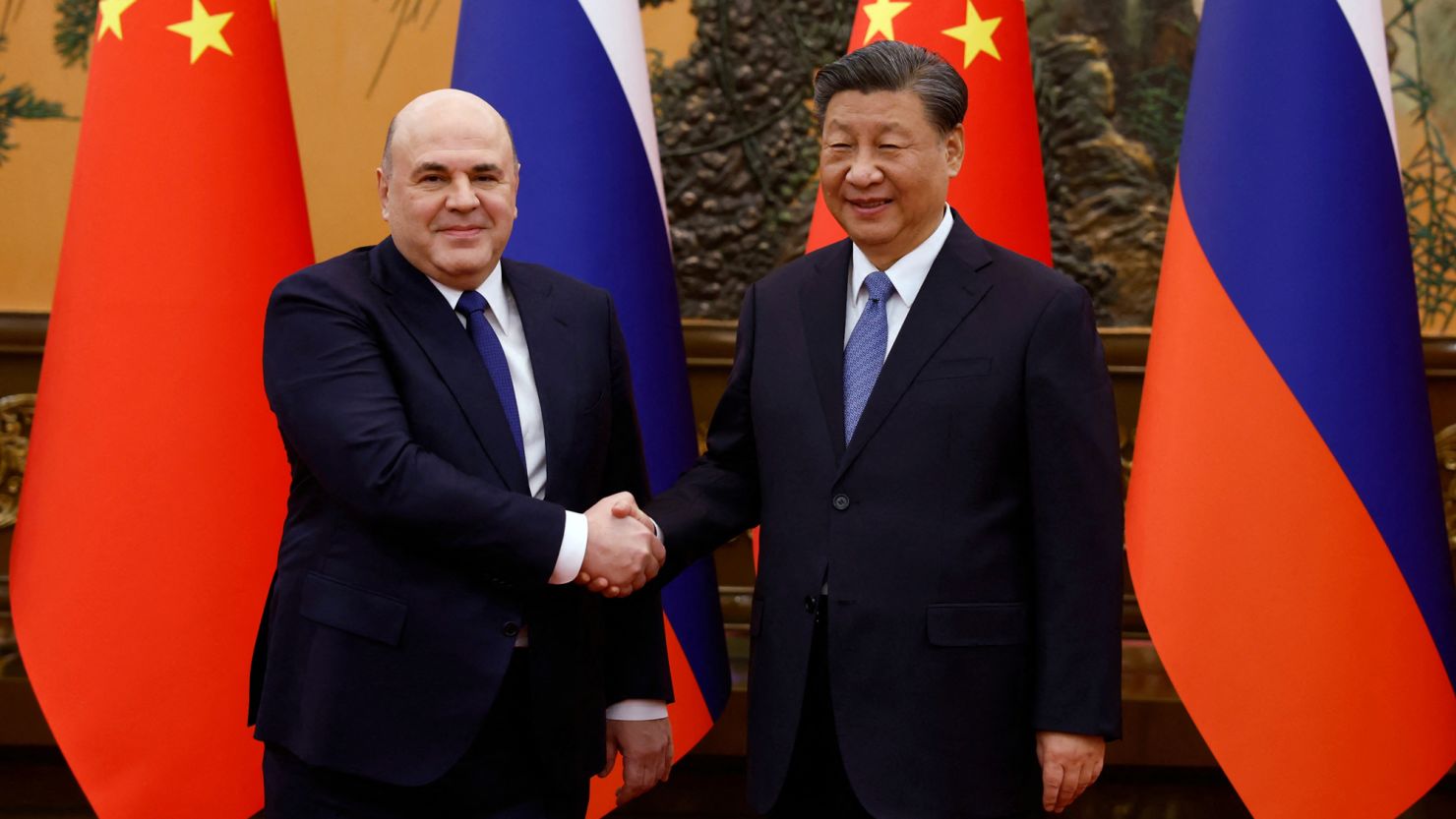Editor’s Note: Sign up for CNN’s Meanwhile in China newsletter, which explores what you need to know about the country’s rise and how it impacts the world.
China and Russia wrapped up a bumper year of cooperation with an annual year-end meeting in which the two vowed to deepen ties across a range of issues as record trade between them surged past a symbolic target.
Bilateral trade between China and Russia surpassed $200 billion in the first 11 months of the year, Chinese leader Xi Jinping said at a sitdown with Prime Minister Mikhail Mishustin on Wednesday – marking the achievement ahead of schedule of a goal set by Xi and Russian counterpart Vladimir Putin in 2019.
Then, the two leaders pledged to reach the $200 billion mark by 2024. Trade between their countries has continued to expand in the wake of the Kremlin’s 2022 invasion of Ukraine, growing roughly 30% in 2022 to reach a record $190 billion.
The latest trade figures showed the “strong resilience and broad prospects” for cooperation, Xi said Wednesday.
The two sides should “give full play to the advantages of political mutual trust,” and “deepen cooperation on economy, trade, energy and connectivity,” Xi said during the meeting, according to Chinese state news agency Xinhua.
China, the world’s second largest economy, emerged as a key economic lifeline for Russia after the United States and its allies cut trade and imposed sanctions following Moscow’s invasion of its neighbor – sparking criticism that Beijing is propping up Russia’s war effort, despite its claims of neutrality in the conflict and calls for peace.
Chinese leaders see Moscow as a key counterweight against a hostile West and have criticized Western sanctions. It has not supported efforts in the United Nations to censure Russia, while ramping up energy purchases from its northern neighbor and becoming a critical supplier of consumer goods for its isolated market.
Chinese customs data released earlier this month showed China-Russia trade reached a record nearly $218.2 billion for the first 11 months of 2023. But the figure represents just 4% of China’s $5.41 trillion in global trade over the same period.
The two countries also bolstered their cooperation across a raft of issues during Mishustin’s two-day visit, which included an annual high-level, year-end meeting co-chaired with Chinese Premier Li Qiang on Tuesday.
Agreements inked included strengthening trade, transport, ecommerce and customs procedures, and enhancing cooperation on developing Arctic shipping routes, aircraft manufacturing, space exploration, and satellite navigation, according to a readout from China’s Foreign Ministry.
Separately, the Chinese and Russian militaries held regular consultations Wednesday and agreed to “improve the level of strategic coordination” between them and “make new contributions to promoting peace and security in the region and the world,” China’s Ministry of Defense said.
During his engagements, Mishustin hailed the “centuries-old friendship between the Russian and Chinese peoples” and said relations between the neighbors had reached “the highest level ever,” according to Russian state media Tass.
The last year has seen two face-to-face meetings between Xi and Putin, both of whom have made limited overseas trips over the past two years.
Xi chose Moscow for his first overseas visit days after entering his norm-breaking third term as China’s President earlier this year. Putin made a rare overseas visit to Beijing in October, where he was treated as the guest of honor at a forum celebrating Xi’s Belt and Road infrastructure drive.
During a year-end live broadcast last week, Putin hailed the relationship with China, calling the level of cooperation “unprecedented” and predicting a 30% increase in trade on the previous year.
“The governments of Russia and China are deeply involved in achieving the goals that we set together, my friend President Xi Jinping – also Russia’s friend – and I. The work is progressing rapidly, steadily and confidently,” Putin said, according to a Kremlin transcript.
CNN’s Laura He and Mengchen Zhang contributed reporting.

![China's Vice Chairman of the Central Military Commission Zhang Youxia (L) and Russia's Defence Minister Sergei Shoigu arrive to the Xiangshan Forum in Beijing on October 30, 2023. Beijing says representatives of 90 countries are taking part in this week's Xiangshan Forum, a gathering of military and diplomatic officials billed as its answer to the annual Shangri-La Dialogue in Singapore. (Photo by Pedro PARDO / AFP) / "The erroneous mention[s] appearing in the metadata of this photo by Pedro PARDO has been modified in AFP systems in the following manner: [correcting name to Zhang Youxia] instead of [Zhang Youxian]. Please immediately remove the erroneous mention[s] from all your online services and delete it (them) from your servers. If you have been authorized by AFP to distribute it (them) to third parties, please ensure that the same actions are carried out by them. Failure to promptly comply with these instructions will entail liability on your part for any continued or post notification usage. Therefore we thank you very much for all your attention and prompt action. We are sorry for the inconvenience this notification may cause and remain at your disposal for any further information you may require." (Photo by PEDRO PARDO/AFP via Getty Images)](https://media.cnn.com/api/v1/images/stellar/prod/231030073608-01-xiangshan-forum-103023.jpg?c=16x9&q=h_144,w_256,c_fill)


